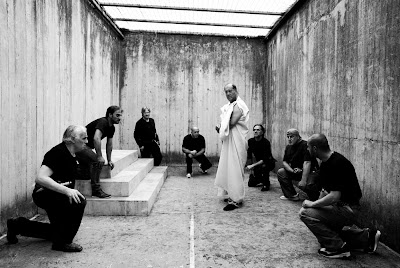Awarded the "Golden Osella" for best original screenplay at the 68th Venice International Film Festival, Yorgos Lanthimos's Alps (2011), from a Lanthimos and Efthymis Filippou scenario, figures to be one of the stronger and certainly, one of the more singular offerings at this year's Starz Denver showcase. Succeeding Lanthimos's (b. 1973) artistically major, Un certain regard Cannes prize-winner and Oscar-nominated Dogtooth (2009), Alps brings the same pervasive absurdity and anti-naturalistic psychology to its portrayal of a four-person firm of professional doppelgängers, the "Alps" of the title, who for the bereaved, will take the place of their lost loved ones. In this sense a film that, similar to Dogtooth, offers itself up obliquely to an analysis of Greek or even European identity - as a death-saturated work that the privileges the ersatz, the copy - Lanthimos's latest, nevertheless, is even more concerned with providing a novel perspective on the nature of acting and performance in cinema that follows from the same narrative discourse. Lanthimos and Filippou indeed underline their thematic emphasis by consistently signposting the acting profession in their citations of contemporary screen stars and by repeating lines of dialogue as the film's 'actors' transition invisibly from rehearsal to performance. As they do so, Alps invites its active, modernist art-cinema spectators to consider what it means for the actor to be authentic and to adequately fill the role, and even more whether it might not be the case that there is a greater cathartic power for the performer than there is for the intended recipient of the fiction. Certainly this seems to hold for instant Lanthimos axiom Aggeliki Papoulia, who transgressively inhabits her various parts to the point of sleeping with her employer (an act that Lanthimos characteristically shoots with extraordinary tactility) and invading their homes. Together with Dogtooth and Athina Rachel Tsangari's Attenberg (2010) for which Lanthimos served as producer and male lead, Alps confirms its young director as the most distinctive new voice in Greek cinema since the 1970s emergence of the late Theo Angelopoulos.
The surprise victor at this year’s Berlin Film Festival and Italy’s official submission for the Best Foreign Language Film Oscar at the 85th Academy Awards, Caesar Must Die (Cesare deve morire, 2012) presents an engaging testament to the transformative power of art and performance. Directed by veteran filmmakers Paolo and Vittorio Taviani – joint recipients of the Maria and Tommaso Maglione Italian Filmmaker Award at this year’s Starz Denver Film Festival – Caesar Must Die is set in the Rebibbia high-security prison in Rome, where a group of inmates prepare to stage a performance of Shakespeare’s Julius Caesar. Mixing conventions drawn from fiction and nonfiction filmmaking, the Taviani brothers chart the expansion of the prisoners’ closed world. In a preponderance of medium close-up framings that attend to the picture's scripted dialogue, Cosimo Rega, Salvatore Striano, and Giaovanni Arcuri remake themselves into Cassius, Brutus, and Caesar respectively. At the same time, they also undergo another more subtle transformation from prison inmates into Shakespearean actors, creating more self-assured, theatrical versions of their own personas. Their intellectual and emotional development is echoed and reinforced at the visual level by the filmmakers’ elegant treatment of cinematic space. The structure of Caesar Must Die is made up of series of rehearsals rendered in stark black-and-white and staged within the impersonal spaces of the prison, culminating in an ecstatic live, color-footage performance. However, over the course of the film the Taviani brothers progressively break with the conventions of documentary style, introducing scripted interactions between the leading actors, more expressive camera movements, and a broader more carefully composed, longer view of the action. In so doing, they effectively open up the walls of Rebibbia, creating an immersive fictional environment that is at once vibrant and fleeting.
Joining Caesar Must Die as a 2012 Berlin prize-winner (earning a special Silver Bear for its forty-one year-old female director, Ursula Meier), Sister (2012) or L'Enfant d'en haut, as the French-Swiss co-production was originally titled, is no less predicated on a fictitious, self-created alternative reality than those witnessed in its two performance-centered counterparts. In Sister, however, this fiction is employed within a naturalistic narrative architecture and for the principle purpose of shock, making any more said inappropriate within this context. What can and must be noted of Sister, a ski-resort 400 Blows (1959) that reaches for a similarly existential ethos, is that its French's title is closer to the spirit of Meier's work, with the filmmaker's narrative and identificatory camera work built around the film's twelve year-old lead Simon (Kacey Mottet Klein). The cinema of fellow French diasporates Jean-Pierre and Luc Dardenne provides another social-realist touchstone for Meier's latest, with their observational aesthetic and rhythmic cutting patterns employed as Simon expertly exercises his criminal trade. Claire Denis cinematographer Agnès Godard, as The Guardian's Jacques Mandelbaum has intelligently noted, vividly juxtaposes the blown-out, bright-white sunshine of the upper class ski-slopes with the overcast (under-class) valleys where Simon and his eponymous older sister Louise (Léa Seydoux) struggle parent-less in their dispiriting tower flat. All of this is to suggest that Meier has created a work of purpose that deserves its modest recognition.
This piece was co-written by Michael J. Anderson and Lisa K. Broad.
Alps, which is being distributed in the U.S. by Kino Lorber, screens at the Starz Denver Film Festival on Friday, November 9th at 2:00 PM and 9:30 PM, and Saturday, November 10th at 7:00 PM. Caesar Must Die screens once at the SDFF, on Saturday, November 10th at 7:45 PM. Sister, which like Caesar Must Die will be distributed in North America by recent start-up Adopt Films, will play in Denver on Friday, November 2nd at 7:30 PM and Saturday, November 3rd at 4:15 PM.



No comments:
Post a Comment